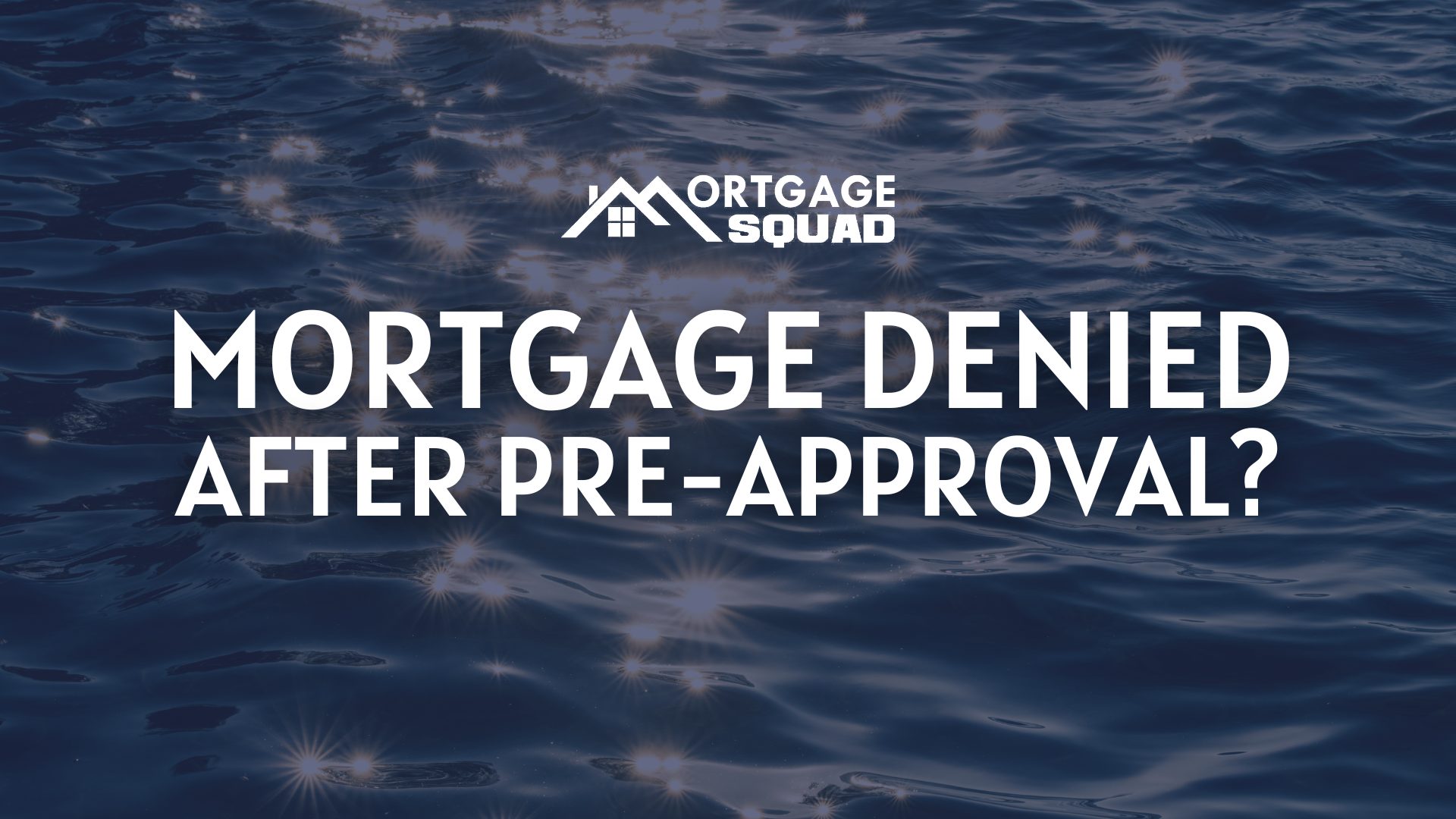Mortgage Denial After Pre-Approval: Understanding the Risks
It’s a commonly asked question, How can a bank deny my mortgage application after I’ve been approved? Getting pre-approved for a mortgage is an exciting step toward owning your new home. However, did you know that nearly 1 in 5 mortgage pre-approvals in Canada are denied at the final stage? At Mortgage Squad, we’ve seen many hopeful homebuyers face the disappointment of a mortgage denial after pre-approval.
Key Insights:
- Pre-approval is not a guarantee of final mortgage approval.
- Changes in employment, credit score, debt levels, or financial documentation can cause a mortgage denial after pre-approval.
- Working closely with an experienced mortgage broker can help you navigate and mitigate these risks.
- Maintaining a stable financial situation during the home purchase process is crucial.
- Be ready to provide additional documentation if requested by the lender.
Changes in Employment
One common reason for a mortgage denial after pre-approval is a change in employment. Lenders typically require at least two years of consistent income and stable employment history. Switching jobs, especially to a different industry, can jeopardize your mortgage approval.
Examples of Employment Changes and Lender Responses:
| Employment Change | Lender Response |
|---|---|
| Switching employers in the same field with similar/higher pay | Acceptable if documented and income is stable |
| Promotion with substantial raise at current company | Permitted if income can be verified |
| Career change to a different industry | Likely voids pre-approval; restart process |
| Gap in employment or extended leave | High probability of mortgage denial due to lack of steady income |
If possible, delay any job changes until after your mortgage is finalized. Always consult your mortgage broker before making employment changes to ensure it won’t affect your mortgage approval.
Negative Impacts on Credit Score
A significant change in your credit score can lead to a mortgage denial after pre-approval. Lenders have specific credit score requirements, and a sudden drop can result in denial or a higher interest rate, increasing your mortgage costs.
Credit Score Range and Example Mortgage Rates:
| Credit Score Range | Mortgage Rate |
|---|---|
| 760+ | 4.25% |
| 700-759 | 4.75% |
| 680-699 | 5.25% |
| 620-679 | 6.00% |
| <620 | Likely denied |
To avoid this, continue making debt payments on time and avoid actions that negatively impact your credit. Maintaining a stable credit score is crucial during the home-buying process.
New and Unexpected Debt
Acquiring new debt before finalizing your mortgage can lead to a mortgage denial after pre-approval. Even small increases in debt can alter your debt-to-income ratio, risking your mortgage approval.
Common Unexpected Debts:
- Private Mortgages or High-Interest Loans: Can increase debt burdens.
- Credit Card Debt: High-interest rates can lead to mounting debt.
- Alimony or Child Support Payments: Can become unexpected financial burdens.
- Tax Liabilities: Unanticipated tax bills can lead to unexpected debt.
Consult your mortgage broker before taking on new debt to ensure it won’t jeopardize your approval.
Lender Guideline Changes or New Requirements
Even after pre-approval, borrowers must comply with new lender guidelines or government requirements. Changes in minimum credit scores, debt-to-income ratios, or savings expectations can affect your approval. A good mortgage broker can help you find alternative lenders if needed.
Low Appraisal Value
If the property’s appraisal value is lower than expected, it can impact the loan-to-value (LTV) ratio, requiring a larger down payment to meet the lender’s requirements. A reliable mortgage broker ensures timely appraisals to avoid surprises.
Tips to Prevent Mortgage Denial After Pre-Approval
- Embrace Financial Discipline: Avoid new credit lines and minimize debt.
- Prepare for the Worst: Set aside a financial cushion for unexpected expenses.
- Consider a Skilled Co-Signer: Provides lenders added reassurance.
- Stay Put in Your Job: Avoid employment transitions after pre-approval.
- Maintain Documentation: Keep paperwork for income, assets, and debts.
- Protect Your Credit: Vigilantly maintain your credit score.
- Communicate with Your Mortgage Team: Transparency is crucial.
Frequently Asked Questions
What happens if my mortgage loan is not approved before the closing date?
If your mortgage loan doesn’t receive final approval, you risk not finalizing the home purchase, losing your deposit, or facing legal action.
Why do lenders scrutinize my bank accounts during the approval process?
Lenders verify income sources, savings patterns, and financial behaviors. Unexplained deposits or withdrawals can prompt additional documentation requests.
How does my credit report impact mortgage approval?
Credit reports and scores are critical. A significant drop in your score can lead to denial or higher interest rates.
What role does a real estate agent play in avoiding mortgage denials?
Experienced agents set realistic expectations on appraised values, helping avoid surprises that could derail your mortgage.
What if my mortgage is denied right before the closing date?
Options may include finding a co-signer, another lender, or walking away and losing deposits.
A mortgage denial after pre-approval can derail your home buying plans. Working with an experienced mortgage broker from Mortgage Squad can help you navigate these risks and secure your dream home. Keep your finances stable, stay informed, and communicate openly with your mortgage broker to avoid last-minute denials.



